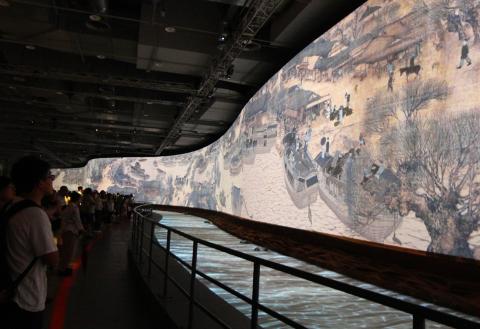After debuting at the Expo 2010 Shanghai China (2010上海世界博覽會) and traveling to Hong Kong and Macau, an animated version of the Song Dynasty painting Along the River During the Qingming Festival (清明上河圖), by 12th-century artist Zhang Zeduan (張澤端), is on show in Taipei. The 25cm by 529cm original is a panoramic portrayal of everyday life in Bianjing (汴京), today’s Kaifeng (開封), the capital of China during the Song Dynasty. Despite its name, the scroll depicts the architecture and scenery of the period and the apparel and activities of the rich and poor, not the rituals of the Qingming Festival (清明節), otherwise known as Tomb Sweeping Festival. Thirty times larger than the original painting, the animated version, which is titled River of Wisdom, is beamed onto a 6m by 110m screen by 12 projectors. The entire work was digitalized by Crystal CG (水晶石數字科技公司) and its subjects and backdrops move and make sounds. There are two versions of the animation that alternate every two minutes: day (691 animated people) and night (377 animated people). Also on display are life-size replicas of the original painting, a Ming Dynasty copy by Qiu Ying (仇英), and a more extravagant 1736 version known as the Qingyuan copy (清院本), commissioned by the Qing court. The original work is stored at the Palace Museum in Beijing.
■ River of Wisdom, 9am to 9pm Mondays to Saturdays, 9am to 6pm on Sundays at Taipei International Flora Exposition EXPO Dome (台北花博爭艷館), 1 Yumen St, Taipei City (台北市玉門街1號) until Sept. 4
■ Tickets are NT$220, available at convenience stores through 7-Eleven ibon, FamilyMart (全家) FamiPort, Hi-Life (萊爾富) Life-ET, and OK Mart OK go kiosks and online at tickets.books.com.tw

Photo Courtesy of Lin King
■ On the Web: river.ishow.gmg.tw

That US assistance was a model for Taiwan’s spectacular development success was early recognized by policymakers and analysts. In a report to the US Congress for the fiscal year 1962, former President John F. Kennedy noted Taiwan’s “rapid economic growth,” was “producing a substantial net gain in living.” Kennedy had a stake in Taiwan’s achievements and the US’ official development assistance (ODA) in general: In September 1961, his entreaty to make the 1960s a “decade of development,” and an accompanying proposal for dedicated legislation to this end, had been formalized by congressional passage of the Foreign Assistance Act. Two

Despite the intense sunshine, we were hardly breaking a sweat as we cruised along the flat, dedicated bike lane, well protected from the heat by a canopy of trees. The electric assist on the bikes likely made a difference, too. Far removed from the bustle and noise of the Taichung traffic, we admired the serene rural scenery, making our way over rivers, alongside rice paddies and through pear orchards. Our route for the day covered two bike paths that connect in Fengyuan District (豐原) and are best done together. The Hou-Feng Bike Path (后豐鐵馬道) runs southward from Houli District (后里) while the

March 31 to April 6 On May 13, 1950, National Taiwan University Hospital otolaryngologist Su You-peng (蘇友鵬) was summoned to the director’s office. He thought someone had complained about him practicing the violin at night, but when he entered the room, he knew something was terribly wrong. He saw several burly men who appeared to be government secret agents, and three other resident doctors: internist Hsu Chiang (許強), dermatologist Hu Pao-chen (胡寶珍) and ophthalmologist Hu Hsin-lin (胡鑫麟). They were handcuffed, herded onto two jeeps and taken to the Secrecy Bureau (保密局) for questioning. Su was still in his doctor’s robes at

Mirror mirror on the wall, what’s the fairest Disney live-action remake of them all? Wait, mirror. Hold on a second. Maybe choosing from the likes of Alice in Wonderland (2010), Mulan (2020) and The Lion King (2019) isn’t such a good idea. Mirror, on second thought, what’s on Netflix? Even the most devoted fans would have to acknowledge that these have not been the most illustrious illustrations of Disney magic. At their best (Pete’s Dragon? Cinderella?) they breathe life into old classics that could use a little updating. At their worst, well, blue Will Smith. Given the rapacious rate of remakes in modern